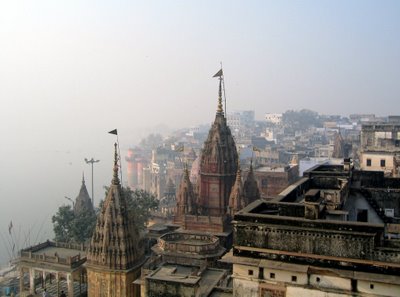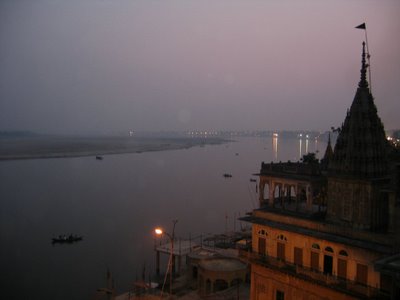Friday, March 10, 2006
Indian City Shows Restraint Amid Bombings
If anything was to set off the next round of bloodletting between India's Hindus and Muslims, many feared it would be this week's bombings in Hinduism's holiest city.
Twenty people were killed in the attacks, which were blamed on Muslim extremists and targeted a temple and the train station.
"Imagine if the Israelis attacked Mecca, or a Muslim man bombed the Vatican — that is how I, how we all, feel," said Ravneet Sharma before offering prayers at the Sankat Mochan temple.
Yet in the days since, this wounded city of temples and holy men has shown remarkable restraint. The feared retaliation has not come to pass, despite the inflammatory rhetoric of Hindu nationalist leaders.
The calm — if angry — aftermath, many here say, is booming India's modern response to ancient tensions that have long set South Asia's Hindus and Muslims against one another.
"So much pain is coursing through my heart," Sharma said. All around him the devout appealed to the monkey god Hanuman, chanting prayers and rubbing sandalwood paste on statues of the deity. The sound of monkeys running over the roof echoed throughout the building.
He made it clear he feels little love for his Muslim neighbors. "They are not my brothers," he said.
But India is a growing economic and diplomatic power and "these extremists want to destroy our peace and prosperity," he said. "Communal violence is their aim. We must control our impulses."
Instead of rioting, most of Varanasi's million people showed their anger through a general strike that shut down the city on Wednesday.
On Friday, the city's narrow alleyways were once again choked with pushcarts and cars and the Ganges River was coursing with boatmen ferrying pilgrims and tourists. Shopkeepers chewing betel leaves tended display cases of cell phones, cheap electronics and Hindi music.
More than 80 percent of India's 1 billion people are Hindu. Their relations with Muslims, the country's largest religious minority, have been largely peaceful since the partition of the subcontinent at independence from Britain in 1947, when more than 1 million people were killed as overwhelmingly Muslim Pakistan was carved from largely Hindu India.
But there have been periodic bouts of sectarian strife. Thousands died in rioting after Hindu militants tore down northern India's historic Babri Mosque in 1992. A campaign to build a Hindu temple at the site propelled the Hindu nationalist Bharatiya Janata Party to power in 1998.
But it's been two years since the BJP was voted out of national office, and with elections coming up in Uttar Pradesh state, where Varanasi is located, party leaders and other Hindu nationalists are making their presence felt here.
Seemingly endless processions of Hindu nationalists have made their way through Sankat Mochan since the attacks, chanting what sound more like a call to arms than a prayer.
Juel Oram, a BJP politician from the eastern state of Orissa, said the attacks are rooted "in the appeasement of Muslims by the government." Uttar Pradesh is run by a politician who has long championed Muslims and lower-caste Hindus.
Although Oram, like the other Hindu nationalists here, said he opposed violence, he spoke of the need to "crush the Muslim element if we are to solve this problem."
It's words like these that have led to violence in the past.
"Indian people pick up rocks and sticks at the behest of politicians," said Ashok Yadav, a 40-year-old shop owner. He said he was angry, but would "vote," not riot.
The temple's spiritual caretaker, 68-year-old Veer Bhadra Mishra, was blunter — "Wherever there is a carcass, you have vultures circling overhead," he said.
A senior civil servant in Uttar Pradesh who has served throughout India said politicians have riled up emotions in the past.
He cited religious riots in western India in 2002 that human rights groups have long charged were encouraged — and at times directed — by BJP officials.
The official, who requested anonymity because such statements could ruin his career, said after the bombings, authorities deployed hundreds of police to keep mobs from forming.
"Now it's best to let these people burn themselves out," said Alok Sinha, Uttar Pradesh's top home ministry official.
Viva - Varanasi 2
Thursday, March 09, 2006
Viva Varanasi

This photograph is dedicated to the many individuals who perished in the bomb blasts in Varanasi on the 6th of March. What centuries of treacherous foreign rule and lax and lazy Indian administration cannot destroy, cannot be disturbed by a couple of silly homemade bombs. People do not understand the real nature and life of Varanasi. As old as civilization itself – I am not in any position to even try and describe the vivacity of the millions that make this wonderful city, and the city itself.
This photograph was taken on 18th December, 2003 when I really saw the ancient city for the first time. I had visited the city before many times – but had never seen the beauty and depth it carries in its arms. The simplicity of little boys flying kites on roof tops, the thrill and fun at seeing monkeys jumping from building to building demanding taxes in the shape of bananas – as though they run an administration in parallel to the district administration, the aura of aartis on Ganga at dawn and dusk, the goose bumps that I am getting right now thinking about the beauty of it all are feelings that cannot be put to words.
Maybe its time we installed CCTV and start frisking everybody that enters and leaves a public place. Its sad – I know – but the enemy is faceless, coward. We live in dangerous times.

Wednesday, March 08, 2006
But you gotta buy by the box

Yup - those are Mangoes!! $6 a box. What was the President talking about when he visited India??
And a whole box of bell peppers for $15 !

Hey - do you want to share some onions?
India? Pakistan? Australia? China?

OK - so enough politics for a week - ok 2 weeks.
As promised - here are some photos of our local farmer's market. What could be better than fresh fruits and veggies? What fun :)

Tuesday, March 07, 2006
"Let's stop beating around Bush"
--
In 2004, top-20 contributors to Bush's election campaign included Citigroup, Bank of America, Microsoft, PricewaterhouseCoopers, Merrill Lynch and Morgan Stanley. In 2005, Citigroup India collected $38 million in fees from Indian companies and is now India's second largest investment banking entity (with 25 offices and branches across 18 Indian cities). Bank of America has Continuum Solutions Pvt. Ltd., its wholly owned subsidiary based in Hyderabad, which processes the Bank's back-office operations (Bank of America has moved hundreds of jobs from the UK to Hyderabad).
Microsoft has just one software development centre outside the US and that is in Hyderabad. Microsoft India has presence in Kolkata, Hyderabad, Pune, Chennai, Bangalore, Mumbai and Gurgoan. In 2002, Microsoft committed $400 million for India. In 2005, $1.7 billion was committed.
PricewaterhouseCoopers has offices in Bangalore, Kolkata, Chennai, Hyderabad, Mumbai, New Delhi, Bhubaneshwar and Pune. DSP Merrill Lynch Limited is now India's largest investment banking entity with offices in New Delhi, Mumbai, Kolkata, Chennai and Bangalore. Morgan Stanley runs India Magnum Fund and India Investment Fund.
Besides the top campaign contributors, Corporate America sees India as a strategic partner. Pepsi, Ford, IBM, Kodak, Coca Cola, Microsoft, Motorola, Heinz, Monsanto, Warner Bros, Federal Express, Bankers Trust, Parke Davis, Intel, JP Morgan, Kellogg, Pfizer, Procter & Gamble, American Int'l Group, Exxon-Mobil, Delta, Boston Consulting, Oracle, Unocal, Xerox, Lockheed, Raytheon, Rockwell, Honeywell, Adobe, AES, Alcoa, American Express, Northrop, McKinsey, Amway, Polaroid, Caterpillar, Dell, Sun, Texas Instruments, NCR, Hewlett Packard, Lucent, Novell, Ingersoll-Rand, American Data, MetLife, Cognizant, Caltex, Tenneco, Covansys and Diebold already have offices in Mumbai, Delhi, Bangalore, Hyderabad and Chennai.
US corporate giants are now dependent on Tata Consultancy, Infosys Technologies, Wipro, Satyam Computer Services, HCL Technologies, Patni Computer Systems, Silverline Technologies, Mahindra, Pentasoft, Mascot, Mascom, Mastek, Polaris, L&T and Hexaware (all Indian software giants). Furthermore, US exports to India were up over 30 per cent last year, making India one of America's fastest growing major export markets.
In Washington, the India Caucus has become a lobby to be reckoned with. Out of a total of 435 representatives elected to the 109th Congress around 120 are official members of the India Caucus (the Congressional Caucus on Pakistan claims to have 55 members of which at least 12 are also members of the India Caucus).
From a geo-strategic standpoint, the Pentagon has already moved China from a 'friendly competitor' to a 'strategic adversary'. And, the Pentagon needs India to counterbalance China; a democratic India which could become an economic as well as a military counterweight to China. An India that will also buy billions of dollars of American weapons systems. Deep down, Indian elite also craves to stand up to China and that India cannot do without American help. In effect, Indo-US relationship is economic, political and strategic.
Then there is the 'Great Game in Central Asia' where Russia and China both long for ending America's 'monopoly in world affairs'. The Russia-China axis is propagating the Shanghai Cooperation Organisation (SCO) as a challenge to America's central Asian strategy. The Moscow-Beijing nexus has brought Iran and Uzbekistan under its tent. America is actively courting India (is it courting or is a wedding in progress?) after having brought Georgia, Ukraine and Azerbaijan under her tent. Where does Pakistan stand in this 'Great Game'?
Islamabad is a mere 425 miles from New Delhi but Pak-US relationship is neither economic nor political. In Islamabad, Bush's top-5 agenda items were terrorism, terrorism, cross-border terrorism, non-proliferation and democracy. America sees Islamabad's misnamed 'Constitution Avenue' sitting on top of several fault lines; a civil-military fault line, a fundamental-moderate fault line and a whole host of ethnic fault lines (all besides the tectonic one). For Bush, Islamabad is all about challenges.
America looks at India and sees economic buoyancy-cum-political stability. America looks at Pakistan and finds neither. America looks at India and sees opportunities. America looks at Pakistan and sees nothing but challenges.
Should I be mad at Bush because Bush does not treat us as India's equal?
--
Friday, March 03, 2006
Oh! the questions I have

Oh Condi, My Condi,
Thou art beautiful – why art thou not mine,
Even if thou art not mine, that doesn’t mean I can’t have an eyeful.
Like India’s presidential palaces, thou stand tall, and graceful.
Like India’s multitude, thou art colorful and smart.
Oh Condi, My Condi,
Where did thou get that dress?
Did thou have it when we leave our great country?
Or did thou ask Singh to have one sewn for thou.
Why doesn’t the lady next to me wear anything like that – ever?
Oh Condi, My Condi,
The questions I have, can anyone answer?
Oh Condi, My Condi,
Why art thou not mine?

What a Shame
What a site it was – Communists and Muslims holding rallies and mass protests – complete with Osama posters and claims that Osama is our leader – and more dear to us than our parents. Who says India does not have al-qaeda. Seems like a claim 5 years ago that said
What were they demonstrating for? Agreed – that the
That is the problem in
Excuse me for this poor analogy – but this is what
But maybe – this is what a bottom up, free society is like. Had Bush been in

